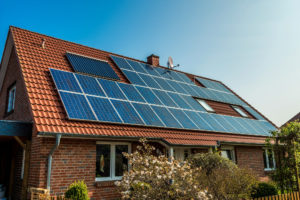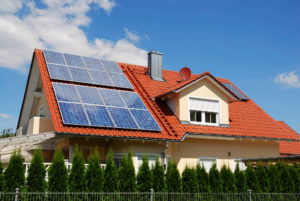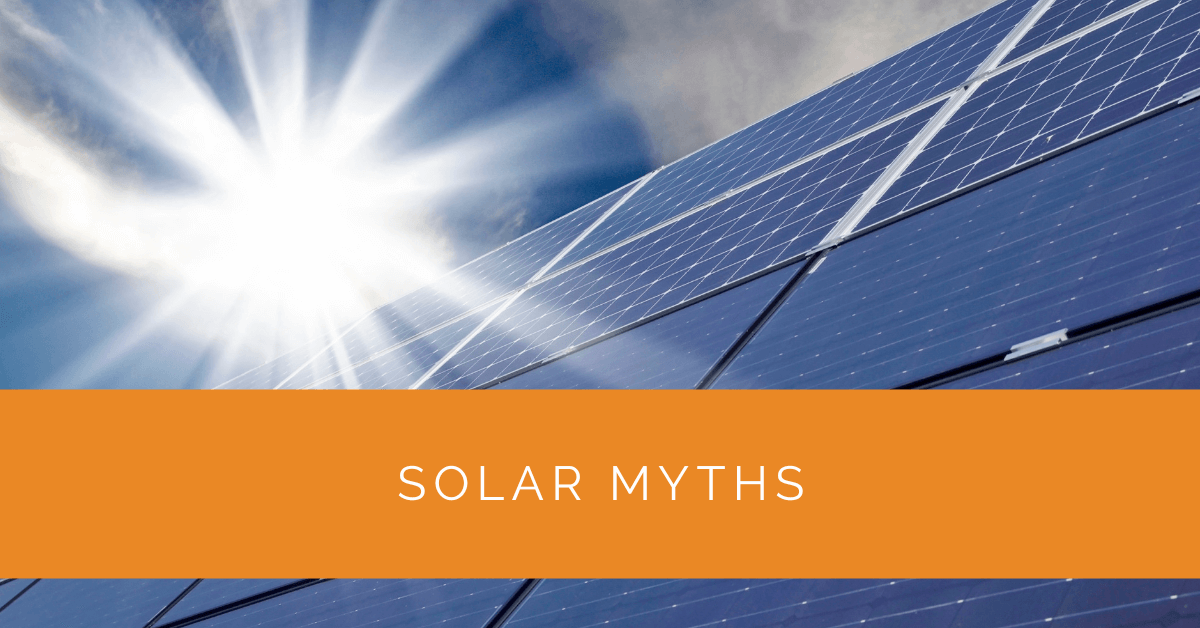Solar energy is a rapidly growing sector of renewable energy, offering a clean and abundant source of power. However, as with emerging technology, misconceptions and myths can cloud the truth. This article aims to debunk some common solar myths and provide homeowners with accurate information about solar power.
Contents
- 1 Key Takeaways
- 2 The Emergence of Solar Energy and the Myths That Cloud Its Progress
- 3 Myth 1: Solar Panels Are Ineffective in Cloudy or Cold Weather
- 4 Myth 2: Going Solar Means Disconnecting from the Electricity Grid
- 5 Myth 3: Solar Energy is a Costly and Economically Unviable Option
- 6 Myth 4: Solar Panels Will Cause Damage to Your Roof
- 7 Myth 5: Solar Energy Systems Require Constant and Extensive Maintenance
- 8 Myth 6: Excess Energy Produced Can Be Stored in Battery Systems
- 9 Myth 7: Solar Panels are Detrimental to the Environment After Their Lifetime is Used Up
- 10 Myth 8: Solar Panels are Manufactured Using Toxic Materials
- 11 Myth 9: Solar Panels Consume More Energy During Manufacturing Than They Produce
- 12 Myth 10: Solar Panels Make Your Home Unattractive
- 13 The Undeniable Facts About Solar Power
- 14 Expert Insights From Our Solar Panel Installers About Solar Myths
- 15 Experience Solar Excellence with Us!
Key Takeaways
- Solar power is a reliable and cost-effective source of renewable energy, capable of reducing electricity bills and increasing property value.
- Common myths about solar power, such as its ineffectiveness in cold or cloudy weather and the supposed damage it causes to roofs, are largely unfounded.
- Despite initial costs, the long-term savings and environmental benefits make solar power a viable and sustainable energy option for homeowners.
The Emergence of Solar Energy and the Myths That Cloud Its Progress
Solar power has emerged as a leading player in the realm of renewable energy. Its rapid growth is a testament to its potential as a sustainable, clean energy source. However, as with any innovative technology, it’s not uncommon for misconceptions to arise. These myths can create unnecessary barriers, preventing homeowners from fully embracing the benefits of solar power.
The Compelling Reasons to Go Solar: Unpacking the Benefits of Solar Power
The decision to go solar has many benefits beyond the individual homeowner. Solar power is a renewable energy source that reduces your carbon footprint and offers significant financial advantages. From reducing your monthly electricity bills to potentially increasing your property’s value, the benefits of solar power are manifold. Moreover, by going solar, you contribute to a larger global effort to reduce dependence on fossil fuels and combat climate change.
Unraveling Solar Myths and Misconceptions: A Closer Look at the Facts
Despite the clear advantages of solar energy, numerous myths persist. These misconceptions often stem from a lack of understanding of the technology and its capabilities. To fully appreciate the benefits of solar power, it’s crucial to separate fact from fiction. Let’s debunk these myths one by one, shedding light on the realities of solar power.

Myth 1: Solar Panels Are Ineffective in Cloudy or Cold Weather
One common myth suggests that solar panels are ineffective in cloudy or cold conditions. However, the reality is that solar panels can generate electricity even under overcast skies or in cold temperatures. While it’s true that solar panels operate at peak efficiency under direct sunlight, they can still produce power in less than ideal conditions. The solar panels’ photovoltaic (PV) cells convert light into electricity, not heat, making them effective even in colder climates.
Myth 2: Going Solar Means Disconnecting from the Electricity Grid
A prevalent misconception is that installing solar panels equals going off the grid. In reality, most residential solar installations remain connected to the electricity grid. This connection allows homeowners to draw power from the grid when their solar panels aren’t producing enough electricity, such as during nighttime. Additionally, this grid connection facilitates a process known as net metering, where homeowners can sell excess electricity back to the grid, further offsetting their energy costs.
Myth 3: Solar Energy is a Costly and Economically Unviable Option
While the initial cost of solar installation can be significant, the long-term savings make solar energy an economically viable option for many homeowners. Over the past few years, the cost of solar panels has steadily decreased, making solar power an increasingly affordable renewable energy option. Furthermore, various incentives, such as tax credits, can help offset the initial cost of installation, making solar power an attractive investment.
Myth 4: Solar Panels Will Cause Damage to Your Roof
Another myth suggests that solar panels will cause damage to your roof. However, when properly installed, solar panels should not cause any harm to your roof. They can even protect the portion of the roof they cover by shielding it from the elements. Solar panels are mounted on frames securely attached to your roof, not directly to the roof itself, minimizing the risk of damage.
Myth 5: Solar Energy Systems Require Constant and Extensive Maintenance
Solar panels are designed to be low-maintenance, requiring minimal upkeep to function optimally. The lack of moving parts in a solar panel reduces the likelihood of malfunctions that require repair. Routine inspections and occasional cleaning are all needed to keep your solar panels in top shape.

Myth 6: Excess Energy Produced Can Be Stored in Battery Systems
While some solar energy systems include battery storage, not all do. Many grid-tied solar systems do not include battery storage, instead relying on the grid to supply power when the panels are not producing electricity. However, battery storage can be a valuable addition to a solar energy system, providing power during outages and reducing reliance on the grid.
Myth 7: Solar Panels are Detrimental to the Environment After Their Lifetime is Used Up
Contrary to this myth, solar panels can be recycled at the end of their life. Many solar panel components can be reused, reducing the environmental impact of their disposal. As a form of renewable energy, solar power has a significantly lower environmental impact than traditional forms of energy.
Myth 8: Solar Panels are Manufactured Using Toxic Materials
Solar panels are primarily made from silicon, a material derived from sand. They do not contain toxic materials that could harm the environment. The production process for solar panels is also environmentally friendly, with manufacturers continually seeking ways to reduce their carbon footprint.
Myth 9: Solar Panels Consume More Energy During Manufacturing Than They Produce
Solar panels do require a significant amount of energy to produce. However, they generate far more energy over their lifetime than is used in their manufacture. This is known as the energy payback period; for solar panels, it’s typically four years or less.
Myth 10: Solar Panels Make Your Home Unattractive
Aesthetics are subjective, but many homeowners find solar panels a sleek and modern addition to their homes. Solar panels can be installed in various ways to minimize visual impact, and some panels are designed to blend in with traditional roofing materials.
The Undeniable Facts About Solar Power
Solar power is a reliable, cost-effective, and environmentally friendly source of energy. By debunking these common solar myths, we hope to encourage more homeowners to consider solar power as a viable option for their energy needs. With the benefits of reduced electricity bills, potential tax credits, and the satisfaction of contributing to a sustainable future, there’s never been a better time to go solar.
Expert Insights From Our Solar Panel Installers About Solar Myths
Many people believe that solar panels are ineffective in cloudy or cold weather, but this is simply not true. Solar panels can generate electricity even under overcast skies and in colder temperatures. The key is light, not heat.
Senior Solar Installer
There’s a misconception that going solar means disconnecting from the grid. In reality, most residential solar systems remain connected to the electricity grid, allowing homeowners to draw power when their panels aren’t producing enough and to benefit from net metering.
Lead Solar Technician
Properly installed solar panels will not damage your roof. They can protect the covered portion from the elements. Installation involves mounting the panels on secure frames, ensuring your roof remains intact and undamaged.
Solar System Specialist
Experience Solar Excellence with Us!
Trust in Solar Panels Network USA, where our seasoned experts deliver top-quality solar solutions for homes and businesses nationwide. With a legacy of countless successful installations and a commitment to sustainable energy, we’re your reliable partner in the solar journey. Ready for a brighter, eco-friendly future? Call us now at (855) 427-0058 and harness the power of the sun!
About the Author
Solar Panels Network USA stands at the forefront of solar energy solutions, driven by a team of seasoned solar engineers and energy consultants. With over decades of experience in delivering high-quality solar installations and maintenance, we are committed to promoting sustainable energy through customer-centric, tailored solutions. Our articles reflect this commitment, crafted collaboratively by experts to provide accurate, up-to-date insights into solar technology, ensuring our readers are well-informed and empowered in their solar energy decisions.

